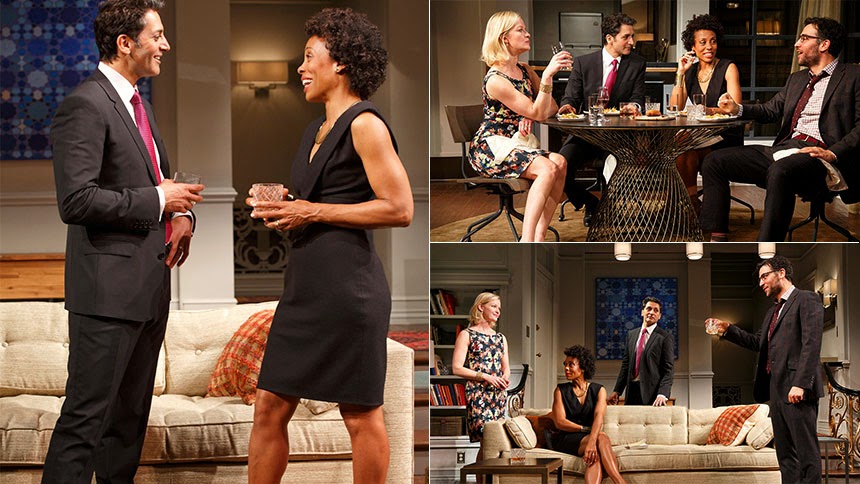 |
| Cavalleria Rusticana - Sicilian church |
 |
| Sarah Heltzel - Mezzo-soprano |
 |
| Evening view from Montague St. |
 |
| Taperia - Heated patio (where we dined!) |
unknown, surprisingly, to either of our Brooklynite companions. The restaurant, I should note here, is friendly, very attentive to needs of diners, plenty atmospheric, ethnic, quiet ... and our meal added up to near perfection in a series of 7 or 8 small plates (@ $6-10 each).
At the top of our list were the Spanish chorizo cubes cut up & blended into a fragrant & appealing stew of garbanzos, onions & tomatoes (so
 |
| Spanish chorizo - in stew |
 |
| Flan - topped w/jellied fruit & whipped cream |
 |
| NY TIMES - December 5th |
In last weekend's New York Times / SportsSunday (December 7th), a bunch of staff writers & editors jointly contemplated the world without watching football in an article entitled "Who Needs Football?" (their starting point was here: "... take a break from the ritual masochism ... anything you do will be less boring than watching a couple of lousy teams play ineptly against a couple of other lousy teams). And then they provided a batch of "suggestions for better ways to spend your Sunday." Their suggestions included such possibilities as "Explore the City" (which we do, by definition, in each nybeat blog post); "Go to the Opera" (done, too, see above); "Eat" (we continually seek out & examine new restos & venues not yet fully known to us) ...
 |
| Benedict Cumberbatch / Alan Turing |
First, see (!) the new film,The Imitation Game, featuring Benedict Cumberbatch in a subtly brilliant performance as Alan Turing, the British mathematician, logician & computer wizard (father of computing/computer science & artificial intelligence), in his central role as the "morally dubious" cryptographer who solved the "Enigma code," the German strategic communications code during the 2nd World War, and, which, arguably (we are told) aided the Allies in ending the war some two years earlier than it might have otherwise lasted.

More or less faithful to the book on which it is based - Alan Turing: The Enigma, by Andrew Hodges - the film (directed by Morten Tyldum) focuses centrally on Turing and, specifically, on the intricate narrative details surrounding the sequence of events just prior to the cracking of the "indecipherable" German code.
Carefully constructed (even "sculpted"), the film's components fuse together & unite the three unequal constituent threads of the film - replete with post-war revelatory scenes; flashbacks to Turing as a "difficult" young public school student; and, foremost, presenting the time frame (however condensed & intensified) at Bletchley Park, the UK center where the "team-building" & code-breaking efforts take place. That is, all three narrative strands merge - as a cinematic force - to depict the period, the war-time work, post-war difficulties with the "authorities," and Turing's idiosyncratic personality ... his genius, his temperament, his sexuality, his interpersonal skills (or lack thereof), and his analytical methods.
.jpg) |
| Alan Turing / Bronze bust |
 |
| Ayad Akhtar - Playwright |
Tautly directed by Kimberly Senior, the play, in four scenes (between 2011 & 2012), takes place in a stylish, commodious upper East Side apartment and explores the personhood, the personae - values, conscience, self-worth, hopes, desires, motives, depths, solidity - of one Amir (Hari Dhillon), a thirty-something Pakistani-American lawyer and his relationship(s) to his wife, Emily (Gretchen Mol), a nephew, Abe (Danny Ashok), an Afro-American colleague, Jory (Karen Pittman), and her husband, Abe (Josh Radnor), an art dealer.
 |
| Hari Dhillon - Amir |
At the end of Scene 4, when the play is about to conclude, and things in the apartment are both psychologically and
 |
| Three photos - from Disgraced |
The play, in short, is about Amir's fall, his dislocation, his disorientation, a crisis in his identity, resulting, ultimately in loss - of a job, a partnership, an American wife, his American friends (the black & Jewish couple), and a way of life as an American, an American professional. You will, indeed, formulate your own serious questions as you view the play and, certainly, afterwards, after you have chewed over & digested what you have just witnessed.
So, once again, as The New York Times editors formulate the question for us: Who needs football? Come on ... get serious ... Really!

No comments:
Post a Comment